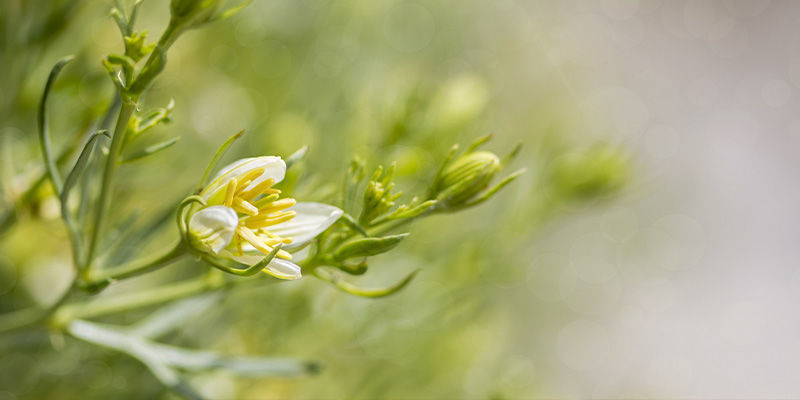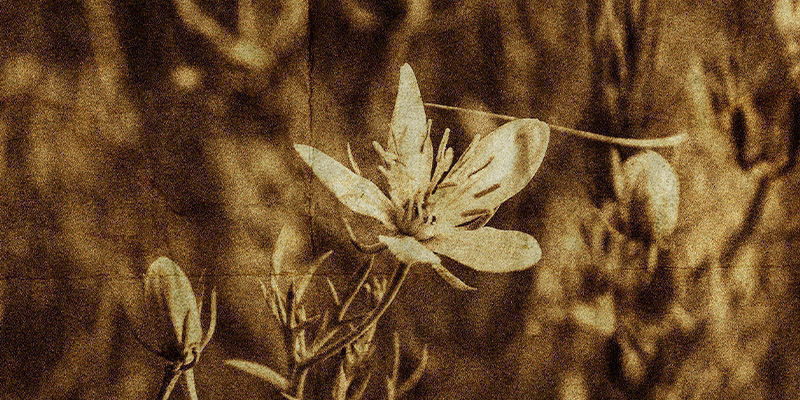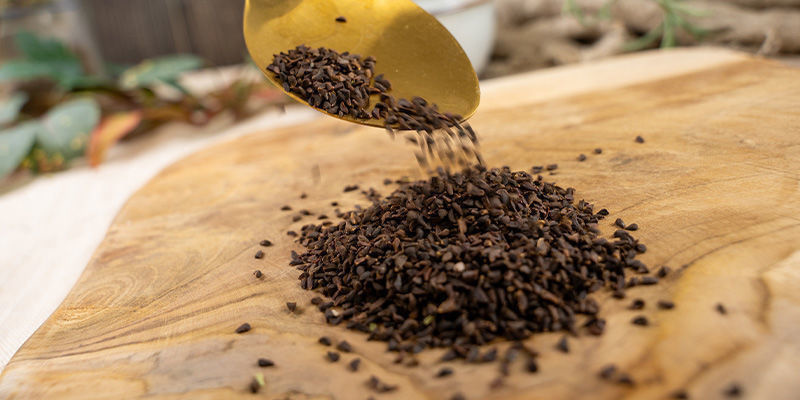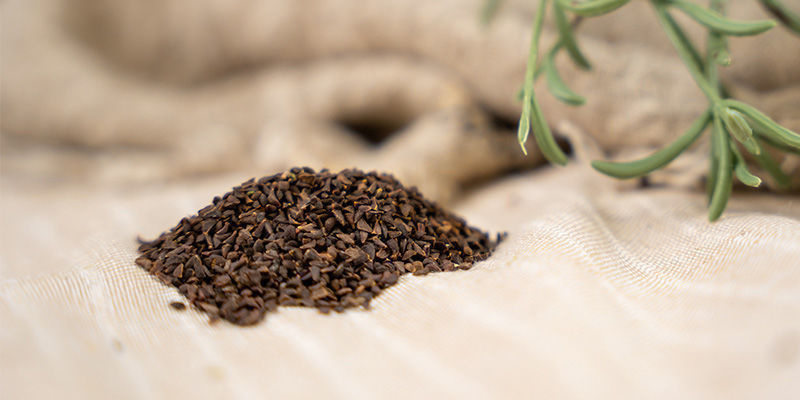
Everything You Need To Know About Peganum Harmala
Boasting a single white flower, Peganum harmala plants may not look all that impressive, but they possess a sophisticated chemical structure that’s been harnessed for centuries in folk holistic practices. Keep reading to find out what makes this "magical" plant so special.
More commonly known as wild or Syrian rue, Peganum harmala L. is a perennial flowering plant with a distinctly unpleasant taste and smell. But while it may not sound that appealing on paper, this herbaceous species has a trick up its sleeve. We’re going to explore everything you need to know about this centuries-old plant, including its potential to augment our everyday lives.
What is Peganum harmala?

The secret to Peganum harmala is its seeds, bark, and roots, which contain a diverse mix of alkaloids; specifically, two monoamine oxidase inhibitors (MAOIs)—harmine and harmaline. This unique class of compounds inhibits the release of certain enzymes in the body and is used clinically to address several mood-related disorders.
Interestingly, wild rue flowers just once a year before the plant dies off during the winter, regrowing from the rootstock the following spring. The problem, however, is that this species is not only considered invasive but also poisonous to livestock. As such, many countries, including America and China, have strict regulations, and landowners must take swift action to remove any natural infestations.
The history of Peganum harmala

The earliest evidence of Peganum harmala dates back at least 7,000 years when drawings of the harmel plant appeared on chlorite cups linked to ancient Jiroft Mesopotamian culture. This early Bronze Age culture is specific to a province of Iran, which makes sense considering the plant is rather fussy about its growing conditions. Peganum harmala prefers a temperate desert climate and only grows well in dry, mineral-rich soils.
However, this exclusivity led to extensive use in areas such as Iran, Turkey, and Morocco, where the plant and its seeds are popular in folk preparations. The herb's mildly hallucinogenic nature gave wild rue a "magical" reputation, especially in early Persian cultures yet to understand the plant's diverse chemical structure.
Potential benefits of Peganum harmala

With an extensive history of use, it wasn't long before scientists put the harmel plant under the microscope. Keen to understand its pharmacological properties, they soon discovered that nearly all parts of the plant contain alkaloids; potent chemical compounds that can have various applications.
- Peganum harmala and the nervous system: A recent study sought to examine the link between several key alkaloids found in Peganum harmala and the activation of dopamine receptors (Pratama et al., 2021).
Not only do these receptors affect our emotions, movement, and in-built reward systems, but they are also implicated in various neurological diseases. Interestingly, the researchers found that the alkaloids dipegine, harmalanine, and harmalacine showed the most potential, with all three acting as dopamine antagonists.
- Peganum harmala and the immune system: Another paper aimed to establish a connection between Syrian rue's use in folk practices and its potential modern clinical applications (Abbas et al., 2021).
After carefully studying the chemical composition of the herb's key constituents, the paper surmised that "extracts of P. harmala exhibit significant antioxidant and anti-inflammatory activities", adding that "more detailed studies are needed to elucidate the possible mechanisms of action".
How to use Peganum harmala

While Peganum harmala's exact therapeutic value remains under investigation, there's no disputing that this plant is consumed in a variety of different ways. Whether in the form of extracts (usually capsules), chewing the seeds raw, or grinding them into a fine powder, there are several ways to experience the mind-altering properties of this ancient plant.
For the uninitiated, capsules are the most sensible option. Provided you purchase them from a reputable seller, you'll know precisely how much Peganum harmala extract you're consuming. Eating raw seeds offers a truly authentic approach, but you'll want to take it slow and steady. We'll cover the side effects in more detail shortly, but consuming an excessive dose of Syrian rue can lead to nausea, vomiting, and confusion.
Dosing Peganum harmala
Unfortunately, specific information on dosing Peganum harmala is lacking. While scientists know there is potential for beneficial interactions, we don't fully understand the mechanism at play, which limits the ability to specify dosage. It's up to the individual to decide the optimal dose; however, given the plant's hallucinogenic properties, it's best to take a cautious approach to consumption.
Possible risks of Peganum harmala

Like with many natural substances, the alkaloids contained within Peganum harmala have the potential to cause a wide array of side effects. Now, these seem to be dose-dependent (the higher the dose, the greater the risk), but you should always take a tentative approach to Syrian rue, regardless of dose. Possible side effects include:
- Nausea
- Vomiting
- Confusion
- Tremors
- Low blood pressure
There's also the taste and smell of the plant to consider. In its natural habitat, this was an excellent defence against grazing animals, but at home, it can make preparation and consumption even trickier, with many describing the aroma as unpleasant and foul!
Peganum harmala: Magical seeds with much still to learn

There's no denying the magical reputation of Peganum harmala, which has accrued over centuries of holistic use. From its influence on early Persian culture to its application in modern clinical settings, the herb continues to show potential. Provided you can get past the plant's naturally unpleasant aroma and taste, the seeds contain an abundance of potent alkaloids that can influence the mind and body in exciting, otherworldly ways.
- Abbas, Malik Waseem, Hussain, Mazhar, Qamar, Muhammad, Ali, Sajed, Shafiq, Zahid, Wilairatana, Polrat, Mubarak, & Mohammad S. (2021/1). Antioxidant and Anti-Inflammatory Effects of Peganum harmala Extracts: An In Vitro and In Vivo Study - https://www.mdpi.com
- Pratama. (2020). Peganum harmala and its Alkaloids as Dopamine Receptor Antagonists: in Silico Study - https://biointerfaceresearch.com
-
 3 min
13 November 2023
How To Use A Capsule Machine
Simple and highly effective, capsule machines give you the flexibility to dose from home with precision and certainty. Keep reading to find out how and why you should start using a capsule machine...
3 min
13 November 2023
How To Use A Capsule Machine
Simple and highly effective, capsule machines give you the flexibility to dose from home with precision and certainty. Keep reading to find out how and why you should start using a capsule machine...
-
 4 min
15 August 2023
What Is Mexican Tarragon And How To Prepare It
Ever wanted to aid lucid dreaming with a plant that was also used to subdue sacrificial offerings before their hearts were pulled out? If so, keep reading. We break down everything you need to know...
4 min
15 August 2023
What Is Mexican Tarragon And How To Prepare It
Ever wanted to aid lucid dreaming with a plant that was also used to subdue sacrificial offerings before their hearts were pulled out? If so, keep reading. We break down everything you need to know...





 United States
United States











